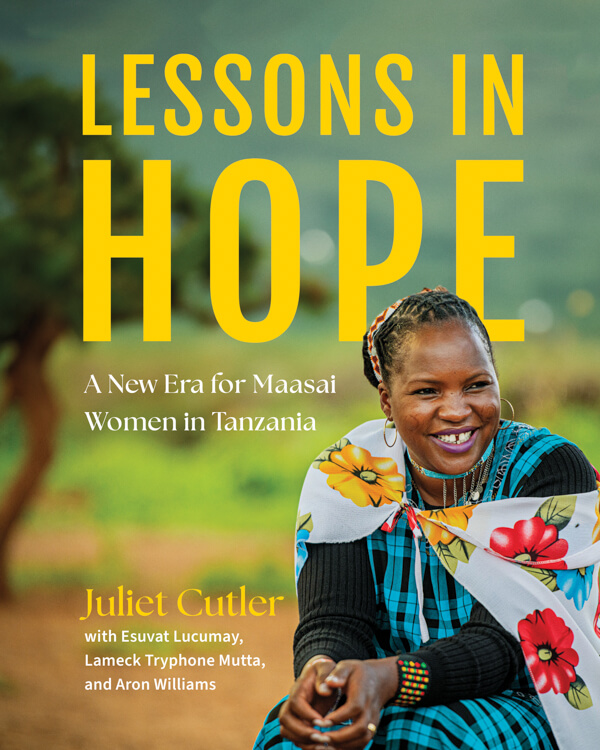
Juliet Cutler is a writer and exhibit designer for museums, parks, and cultural centers around the world. In 1999 and 2000, Juliet lived in Tanzania, where she taught English at the first school for Maasai girls in East Africa. She recounts her experiences during those years in her award-winning first book, Among the Maasai. Twenty-five years later, she illustrates the positive impacts of education on Maasai women in her second book, Lessons in Hope. Juliet regularly returns to Tanzania to support causes that uplift Maasai women and girls. She currently lives with her husband, Mark, near Atlanta.
about LESSONS IN HOPE: A NEW ERA FOR MAASAI WOMEN IN TANZANIA

In this inspiring collection of interviews and portraits, over twenty Maasai women share the ways education has transformed their lives by giving them the tools to overcome poverty and empowering them to make profound differences in their communities.
Through their stories, the women featured in Lessons in Hope lay bare the overwhelming challenges many Maasai women and girls continue to face. For some, hunger hovers nearby, only one bad drought away. Many must raise children without running water or electricity. Most struggle to gain a basic education, see a doctor, or earn an income. And too many Maasai girls still endure female genital mutilation, early forced marriages, and other forms of violence.
Yet these remarkable women have overcome the odds. As graduates of the first school for Maasai girls in East Africa, these thriving leaders now hold positions in education, health care, nonprofits, government, and business. Their stories reveal a cadre of Maasai women working toward positive change within their own culture and offering a compelling, optimistic vision for the future.
Proceeds from the sale of this book support education for Maasai girls.
about Among the Maasai

In 1999, Juliet Cutler leaves the United States to teach at the first school for Maasai girls in East Africa. Captivated by the stories of young Maasai women determined to get an education in the midst of a culture caught between the past and the future, she seeks to empower and support her students as they struggle to define their own fates.
Cutler soon learns that behind their shy smiles and timid facades, her Maasai students are much stronger than they appear. For them, adolescence requires navigating a risky world of forced marriages, rape, and genital cutting, all in the midst of a culture grappling with globalization. In the face of these challenges, these young women believe education offers hope, and so, against all odds, they set off alone―traveling hundreds of miles and even forsaking their families―simply to go to school.
Twenty years of involvement with this school and its students reveal to Cutler the important impacts of education across time, as well as the challenges inherent in tackling issues of human rights and extreme poverty across vastly different cultures. Working alongside local educators, Cutler emerges transformed by the community she finds in Tanzania and by witnessing the life-changing impact of education on her students.
Proceeds from the sale of this book support education for at-risk Maasai girls.

